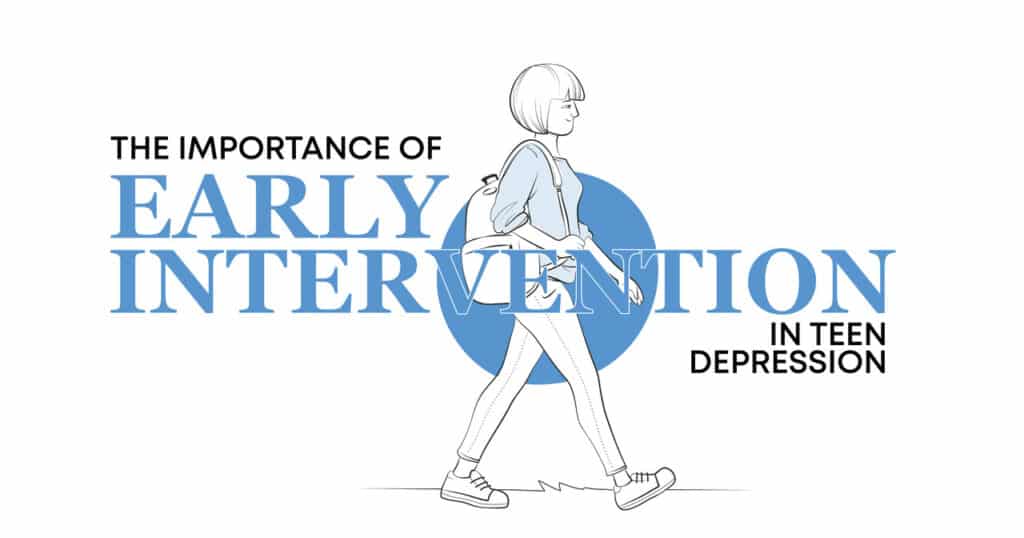Teenage years are often characterized by emotional turbulence, but when those fluctuations turn into persistent feelings of sadness and hopelessness, it could be a sign of depression. Teen depression isn’t just a phase—it’s a severe mental health condition that can have profound effects on a young person’s life. Unlike occasional mood swings or transient sadness, depression in teens is marked by persistent feelings of despair, emptiness, and worthlessness.
Essential Takeaways
- Early intervention in teen depression is crucial for better treatment outcomes and preventing long-term issues.
- Recognizing symptoms of depression and seeking professional treatment can significantly improve a teen’s mental health and quality of life.
- Parents and caregivers play a vital role in supporting their teens by creating a supportive environment and fostering open communication.
The Impact of Untreated Depression
When teen depression goes untreated, it can lead to a range of serious issues. Over time, untreated depression can cause a decline in academic performance as the teen’s ability to focus and engage with their schoolwork diminishes. Social relationships may deteriorate, leading to isolation and loneliness. The risk of depression may increase significantly with family history or if the teen has experienced traumatic events. In the most severe cases, untreated depression can lead to a suicide attempt or suicidal thoughts.
The long-term consequences of untreated depression are far-reaching, affecting not just the individual but also their family and friends. Recognizing and addressing symptoms early is crucial to prevent these severe outcomes and help the teen lead a healthier, more balanced life.
Recognizing the Signs of Depression Early
Common Symptoms in Teens
Recognizing the signs of depression in teens can be challenging because they often mask their feelings or attribute their struggles to typical teenage angst. However, specific symptoms of teen depression are more indicative of depression. These include:
- Persistent Sadness or Irritability: Teens with depression may exhibit prolonged feelings of sadness, hopelessness, or irritability. Unlike typical mood swings, these feelings are persistent and pervasive.
- Changes in Sleep Patterns: Depression often disrupts sleep, leading to insomnia or excessive sleeping. Notice if your teen is sleeping much more or less than usual.
- Altered Appetite: Significant weight loss or gain, or changes in eating habits, can be signs of depression. Look for changes in your teen’s appetite or eating patterns, including a preference for junk food over healthy foods.
- Loss of Interest: A marked loss of interest in activities that previously brought joy or satisfaction is a common symptom of depression. This can include hobbies, sports, or school activities like music class.
- Difficulty Concentrating: Depression can impair cognitive functions, making it hard for teens to focus on their studies or other tasks. You might notice a drop in academic performance or difficulty completing tasks.
Behavioral Changes to Watch For
Behavioral changes can be subtle but significant indicators of depression. These may include:
- Withdrawal from Social Activities: Teens with depression often withdraw from friends and family, preferring to isolate themselves. They might skip social events or avoid interacting with others, leading to time with friends becoming rare.
- Decline in Academic Performance: A noticeable drop in grades, lack of interest in schoolwork, or frequent absences can be signs that a teen is struggling with depression.
- Changes in Social Habits: Changes in how a teen interacts with peers, such as becoming more secretive or avoiding social gatherings, can indicate underlying issues.
Physical Symptoms and Warning Signs
Physical symptoms often accompany depression and can be mistaken for other health issues. These might include:
- Unexplained Aches and Pains: Teens with depression might complain of physical symptoms like headaches, stomachaches, or general body pain without a clear medical cause.
- Fatigue: Persistent fatigue and a lack of energy can be signs of depression. If your teen seems unusually tired or lacks motivation, this could be a red flag.
- Changes in Appearance or Hygiene: Neglecting personal grooming or changes in physical appearance, such as wearing the same clothes repeatedly, can signal depression.
The Benefits of Early Intervention
Improved Treatment Outcomes
One of the most significant benefits of early intervention is the improved likelihood of successful treatment. When depression is identified and addressed early, it can prevent the condition from worsening and reduce the duration and severity of symptoms.
Early treatment often leads to quicker relief and a more favorable prognosis. Teens who receive prompt help are more likely to recover fully and resume their usual activities and interests, which can significantly enhance their daily life.
Better Academic and Social Functioning
Addressing depression early can help teens maintain or improve their academic performance and social relationships. With the right support and treatment, they can regain their motivation, focus, and enjoyment in school and extracurricular activities.
Additionally, early intervention can help teens rebuild and strengthen their relationships with peers, reducing feelings of isolation and improving their overall social well-being. It can also mitigate the risk for depression and prevent mental health conditions from worsening.
Prevention of Future Mental Health Issues
Early intervention not only helps in treating current symptoms but also plays a crucial role in preventing future mental health issues. By addressing depression early, teens can learn coping strategies and skills that will benefit them in managing stress and emotional challenges in the future. This proactive approach can help mitigate the risk of developing more severe or chronic mental health conditions later in life, including anxiety disorders or substance abuse.
Practical Steps for Seeking Help
Talking to Your Teen
Starting a conversation with your teen about their mental health can be daunting, but it’s an essential step in providing support. Here’s how you can approach the conversation:
- Be Empathetic and Non-Judgmental: Approach your teen with empathy and understanding. Avoid making judgments or dismissing their feelings. Show that you genuinely care and are there to support them.
- Ask Open-Ended Questions: Encourage your teen to share their feelings by asking open-ended questions. Instead of asking yes or no questions, try asking how they feel or if anything bothers them.
- Listen Actively: Listen to what your teen has to say without interrupting. Validate their feelings and let them know expressing their emotions is okay.
Seeking Professional Help
If you suspect your teen is struggling with depression, seeking professional help is crucial. Here’s how to go about it:
- Find a Mental Health Professional: Look for a licensed therapist or counselor who specializes in adolescent mental health. You can ask your primary care physician for recommendations or search for professionals through online directories. Consider options like online therapy services if in-person visits are difficult.
- Prepare for the Initial Evaluation: During the initial evaluation, the mental health professional will assess your teen’s symptoms and develop a treatment plan. Be prepared to provide information about your teen’s behavior, mood, and any changes you’ve noticed, including a history of depression or mental health conditions in the family.
- Explore Treatment Options: Treatment for teen depression may include therapy, medication, or a combination of both. Discuss the available options with the mental health professional and choose the best approach for your teen’s needs. Options may include behavioral therapy, interpersonal therapy, or antidepressant medication.
Utilizing School Resources
Schools often have resources and support systems in place for students dealing with mental health issues. Here’s how schools can help:
- School Counselors: School counselors can provide support, counseling, and resources for students struggling with depression. They can also work with teachers and parents to create a supportive environment for the student.
- Mental Health Programs: Some schools offer mental health programs or workshops on stress management, coping skills, and emotional well-being. If available, encourage your teen to participate in these programs.
Supporting Your Teen at Home
Creating a supportive home environment is essential for helping your teen manage depression. Here are some practical steps:
- Establish Routines: Consistent daily routines can provide stability and a sense of normalcy. Encourage regular sleep patterns, healthy eating, and physical activity. Engaging in regular physical activity can help alleviate some feelings of depression and improve overall mood.
- Promote Open Communication: Foster an environment where your teen feels comfortable discussing their feelings and challenges. Regularly check in with them and show that you’re available to listen.
- Encourage Healthy Lifestyle Choices: Promote a healthy lifestyle by encouraging regular exercise, balanced nutrition, and adequate rest. These factors can positively impact mental health and overall well-being.
Resources and Support
Online and Community Resources
There are many online resources and community organizations that offer support for teen depression:
- Online Communities: Websites like the National Alliance on Mental Illness (NAMI) and Mental Health America provide valuable information, support groups, and resources for managing teen depression.
- Community Organizations: Local organizations and nonprofits may offer counseling services, support groups, and educational programs for teens and their families.
Recommended Reading and Tools
Educating yourself and your teen about depression can be beneficial. Here are some recommended resources:
- Books: “The Anxiety and Phobia Workbook” by Edmund J. Bourne and “Mind Over Mood” by Dennis Greenberger and Christine A. Padesky offer practical strategies for managing depression and anxiety.
- Self-Help Tools: Apps like Headspace and Calm provide mindfulness and relaxation techniques to help teens manage stress and anxiety effectively.
Conclusion
Understanding teen depression is essential for parents seeking to support their children through this challenging time. By recognizing the symptoms of depression, seeking early professional help, and providing a supportive home environment, you can make a positive impact on your teen’s mental health journey. Remember, early intervention is crucial in improving outcomes and ensuring your teen’s well-being. With the right support and resources, your teen can navigate the challenges of depression and thrive.




